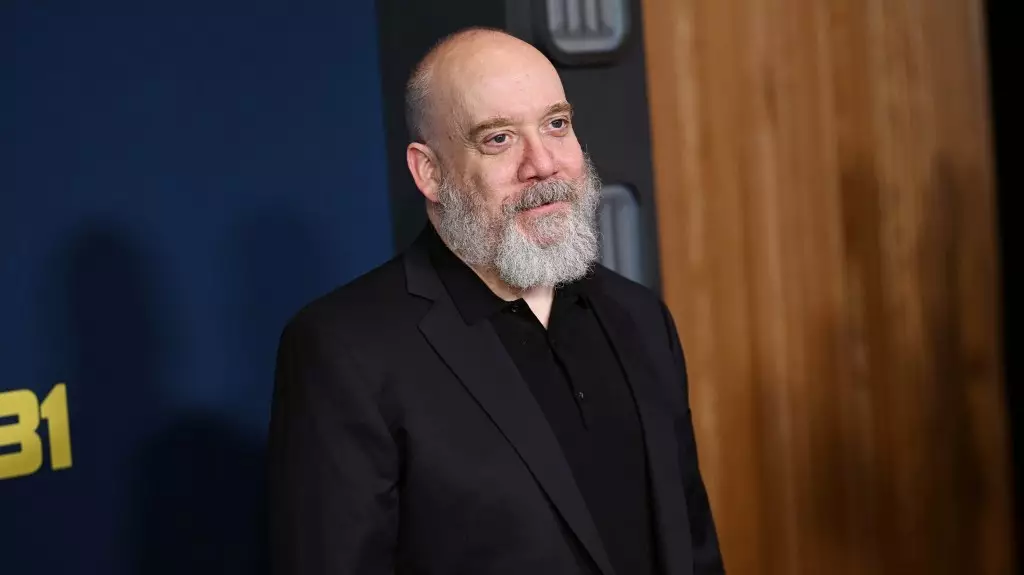In a world where legacy often clashes with the unforgiving passage of time, Paul Giamatti’s reflection on the production of *Downton Abbey: The Grand Finale* offers a poignant reminder of grief intertwined with art. As he recalls his experiences in the beloved series, Giamatti sheds light on a significant void left by the late Dame Maggie Smith. While the film was designed to be a grand conclusion to a beloved narrative, it becomes even more profound in the wake of her passing. Giamatti articulates a sentiment that many of us struggle to express: there’s an irreplaceable absence in spaces once lit by extraordinary figures, whose craftsmanship and talent elevated art to realms beyond imagination.
When Giamatti states, “Not having her there is obviously a huge loss,” he touches on a core truth about the entertainment industry. The power players are not just their characters onscreen; they are the very essence of the stories they help to tell. Smith’s absence is felt not only in her now-silent role as Violet Crawley but also in the emotional landscape of the actors who once shared the stage with her. Giamatti’s declaration of having acted in her spirit reinforces the idea that great artists leave behind more than a legacy; they leave behind an indelible mark on the hearts of those they inspire.
Unexpected Returns and Character Significance
Giamatti’s surprising return to *Downton Abbey* as Harold Levinson reveals an intriguing layer of narrative complexity. Initially taken aback by the invitation to reprise a role he believed to be minor, he reflects the sentiment that many characters in successful narratives often undergo transformations that may not be readily apparent. “I don’t have an important character in this story,” he mentions surprisingly, yet the twist is that his character emerges as significant in this finale. This scenario beautifully illustrates a phenomenon in storytelling that deeply resonates with audiences: the quiet yet impactful roles often serve as the emotional anchors, guiding the plot through uncharted waters.
In an age where sequels flood the entertainment scene, Giamatti’s part resonates as a refreshing reminder that depth and significance may dwell in unexpected corners of a narrative. Talent like his, alongside a rich ensemble cast that includes seasoned players and new entrants alike, enriches the story, making it clear that *Downton Abbey* remains a vibrant tapestry of interwoven lives and histories. Each character, no matter how seemingly small, plays a role in positioning the story against the backdrop of changing times.
A Tribute Beyond the Screen
Gareth Neame, the executive producer, also echoes Giamatti’s thoughts during his comments on the film’s emotional weight following Smith’s death. He emphasizes how the existing storyline intertwines seamlessly with the profound loss felt not only by the characters but by those who brought them alive to audiences worldwide. The thematic mournfulness that accompanies the characters’ expressions of grief creates an almost meta-commentary on how the collective experience of loss transcends fiction, touching upon the universal heartache shared by fans and actors alike.
This poignant narrative fold, as articulated by Neame, accentuates the film’s reflective journey—where the characters are compelled to face their own mourning alongside the audience’s. The conscious design to honor Smith allows viewers to not only celebrate her life but also grieve in unison. The choice to integrate meaningful tributes rather than gloss over the loss reflects a profound sensitivity often absent in mainstream cinema today—a brave decision that acknowledges the complexities of human emotion and the fragility of life.
A Showcase of Strength and Vulnerability
As we approach the film’s theatrical release, anticipation swells. Will *Downton Abbey: The Grand Finale* capture the hearts of loyal fans while holding its own in the world of modern storytelling? Giamatti’s words, thoughtfully selected and delivered, lay the groundwork for the answer: art’s most significant moments arise from genuine experiences—be they joy or grief. As this film seeks to act as a bridge between the past and a mournful present, it reinforces the notion that great narratives endure because of the emotional truths they encapsulate. The essence of *Downton Abbey* lives on, enriched against the backdrop of loss yet continues to share a narrative of hope, continuity, and heartfelt remembrance.



Leave a Reply